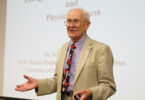As COVID-19 becomes an endemic part of our everyday lives, many people worry about the longevity of vaccines. Grace Gowda, associate professor in the College of Pharmacy, discussed vaccine longevity with 11 Alive amid conversations of COVID-19 vaccine mandates.
Vaccines are created by using a weakened or inactive form of a virus, then adding it to a medium that can be injected.
“You just cook the virus,” Gowda explained. “If you cook the virus, it’s no longer alive. You can use the proteins that come out of it.”
This process has been used for decades for many vaccines that are required for access to things like public school, and they include mumps, measles and rubella, among others.
Some vaccines are able to provide coverage for longer periods of time than others, so the question has now become, how long will COVID vaccines last?
“That’s what everybody wants, one shot,” said Gowda. “But I don’t think it’s a clear-cut case.”
Scientists continue to watch the success of the two shot and booster system, and future boosters might be necessary.






